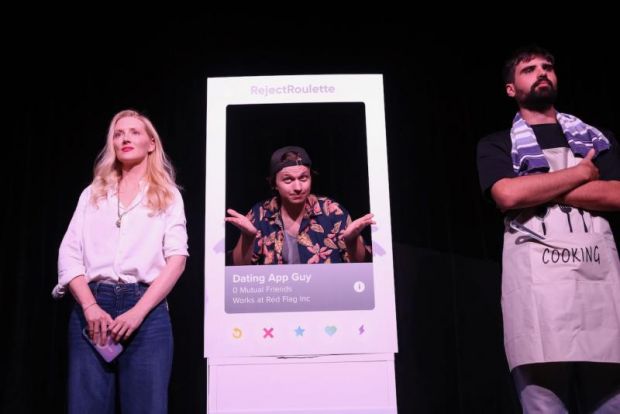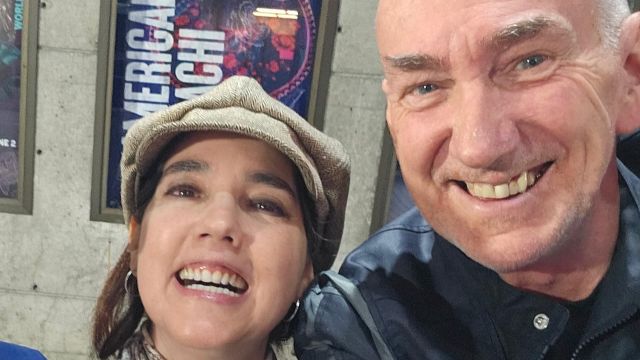The Silent Stages
Image: Mark Cleary with Vange Tapia (founder of LatinX Hollywood).
Short+Sweet Theatre Producer Mark Cleary warns of an existential crisis facing Australia’s performing arts sector.
From my position as Artistic Director of Short+Sweet—which presents festivals across 15 countries—I've witnessed first-hand how the post-pandemic landscape has reshaped our industry. What I see is deeply concerning: a persistent 30% drop in audience attendance that threatens the very survival of independent theatre companies across the nation.
This isn't just another opinion piece lamenting the state of the arts. It's a wake-up call based on concrete data and global observations. As someone who oversees festivals from Manchester to Manila, from Dubai to Delhi, I can attest that while this crisis extends beyond our shores, Australia has a unique opportunity to lead the way in solving it.
 Image: Blind Date - Short and Sweet 2024
Image: Blind Date - Short and Sweet 2024
The Scale of the Crisis
Let's be clear about what we're facing. Theatre Network Australia's research reveals a paradox: while 76% of Australians express interest in attending more performing arts events, actual attendance remains stubbornly low. This isn't merely a post-COVID hangover—it's a fundamental shift in audience behaviour that demands our immediate attention.
The impact of this shift is most severe on independent and smaller performing arts companies. For these organisations, that missing 30% of ticket sales isn't just a dip in revenue—it represents their entire potential earnings after covering production and operational costs. While our larger, well-funded companies can weather this storm through reserves and government support, independent companies face an immediate existential threat.
International data paints an equally concerning picture. In the United States, the arts and entertainment sector reports 11% fewer ticket sales compared to 2019 levels, with total losses in the nonprofit performing arts industry exceeding $3.2 billion through December 2021. Philanthropic giving has fallen by 5%. The United Kingdom's theatre sector experienced even more dramatic declines during the pandemic, with ticket sales initially dropping by 93% and many venues still struggling to recover.
Beyond the Balance Sheet
The implications of this crisis extend far beyond financial statements. Independent theatre companies serve as the research and development arm of our industry. They're the testing grounds for new voices, innovative approaches, and emerging talent. Their loss would create a vacuum in our cultural landscape that no amount of funding to major companies could fill.
These smaller companies are often the most agile and diverse voices in our sector. They bring fresh perspectives and new stories to the stage, frequently achieving remarkable results with minimal resources. They're also typically more connected to their local communities, making theatre accessible and relevant to audiences who might feel disconnected from larger institutions.
The performing arts contribute billions to Australia's economy annually—not just through ticket sales, but through tourism, hospitality, and community enrichment. The sector's health has ripple effects throughout our economy and society. When a theatre company closes, we lose not just performances, but jobs, training opportunities, and vital community connections.

Image: Dating App. Written & Directed by Reena Akhtar Starring: Lucinda Jurd, Seth Eren & Roy Wallace-Cant.
The Global Laboratory
Through Short+Sweet's international network, we've had the unique opportunity to observe how different cultures and communities are responding to these challenges. From our festivals in the United Kingdom to our programs in India, we've seen various approaches to audience engagement and development.
In Southeast Asia, for instance, we've witnessed innovative hybrid models that blend traditional theatrical experiences with modern technology. Our festivals in the Middle East have successfully engaged younger audiences through short-form performances that respect both tradition and contemporary attention spans. These international experiences offer valuable lessons for the Australian context.
What's become clear is that traditional models of theatre presentation and audience development may no longer be sufficient. The pandemic didn't create this crisis—it accelerated trends that were already in motion. The way people consume entertainment has fundamentally changed, and our industry needs to adapt without losing its soul.
A Path Forward
Last October, I wrote to Federal Arts Minister Tony Burke about this issue. The response from Minister Burke's office to my initial outreach was encouragingly swift. While the holiday period naturally slowed progress, the urgency of the situation remains. Through our observations and experiences across multiple markets, we've developed a strategic approach that could help reverse these troubling trends.
This solution isn't about massive funding injections or radical reinvention. Instead, it focuses on practical, implementable changes that could help rebuild audience engagement across the sector. While the details of this strategy are still being refined, its principles centre on making theatre more accessible and engaging for modern audiences without compromising artistic integrity.
Digital innovation plays a role in this strategy, but not in the way many might expect. The National Endowment for the Arts found that 82% of people engaged with arts activities through digital media between 2021 and 2022. However, our approach isn't about replacing live performance with digital alternatives—it's about using technology to enhance and complement the irreplaceable experience of live theatre.

Image: S+S Uncomfortable Silences
The Cost of Inaction
If we fail to address this crisis, the consequences will be severe and long-lasting. The performing arts sector isn't just about entertainment—it's a crucial part of our national identity and cultural diplomacy. The loss of independent theatre companies would deprive Australia of the next generation of performers, writers, and directors who could contribute not just artistically but to our international cultural presence.
The erosion of our theatrical ecosystem would have far-reaching implications. Every closed theatre company represents lost opportunities for emerging artists, fewer platforms for diverse voices, and a diminished capacity for cultural expression. This isn't just about preserving institutions—it's about maintaining the vitality and diversity of our cultural landscape.
A Call for Leadership
What's needed now is not just funding, but leadership and vision. We need a coordinated response that brings together government, arts organisations, and the broader community. The appetite for live performance remains strong—our research shows that audiences haven't lost their desire for theatrical experiences. What's changed is how they engage with the arts.
From my global vantage point, I can say with certainty that this is a solvable crisis. But it requires immediate action, innovative thinking, and a willingness to evolve while preserving the essential magic of live performance. The audience is out there. The challenge—and opportunity—lies in bringing them back through our doors.
The curtain hasn't fallen on Australian theatre. But ensuring it rises again stronger than ever requires us to act now, with purpose and vision. The future of our cultural landscape depends on it.
Subscribe to our E-Newsletter, buy our latest print edition or find a Performing Arts book at Book Nook.

